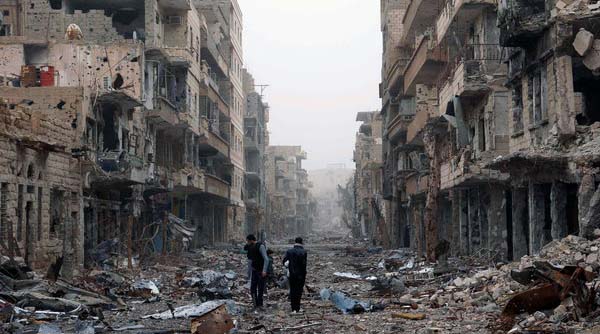It has been more than two weeks that al-Qasir city has changed into the center of brutal battle between rebels and Syrian army. Both sides are trying to take control of this area which is of high strategic importance for both sides. Controlling the bordering city with Lebanon, rebels can easily move into the neighboring country, and for Syrian soldiers, they can access to the shore of Mediterranean Sea.
According to reports, rebellions have asked support from rebellions from across the country to give them a hand to maintain their grasp over the city.
However, due to lack of foreign journalists, the reports are viewed with suspicions but some newspapers’ reports quoting doctors in the city draw a dark and bleak picture of the ground. It is said that there are hundreds of wounded civilians who are not treated properly due to lack of doctors and medicine. The areas under the control of rebellions are cut off and people sometimes should wait for four consecutive days to get access to drinking water.
Previously it was claimed that the city has come under the siege of Damascus loyalists but the updates about entrance of rebellions from other parts of the country show that rebellions still have control over the area.
TV channels related to Hezbollah of Lebanon reported that Syrian armies have arrested large number of Saudi Arabian, Qatari, Algerian, Tunisian, and Lebanese fighters and imprisoned during the clashes in Qasir. Regional media close to opposition also talk about the Hezbollah militants, Iranian and revolutionary guard and also Iraqi volunteers involved in Qasir battle.
There are issues that should be noticed. First of all, it is really not clear how many foreign jihadists are fighting alongside Syrian oppositions, but unconfirmed reports talk of visible number. They have come to Syria only and only to topple the present government and build an Islamic government which still has remained unfulfilled desire for regional Islamists.
They failed to develop their favorite government in Tunisia, Egypt and Libya. However, in all these countries seculars were toppled but secular traditions somehow prevented the Islamic radicals to establish a thorough Shariah-based government. In Egypt, the Muslim Brotherhood came to power, the Islamist party whose political history turns back to more than 80 years. After consecutive civil movement which often led to violence caused the leadership of the party to move slower and avoid developing and implementing an Islamic establishment.
I think that Muslim Brotherhood leaders presently are trying to have two types of brotherhoods: first one, a political Muslim brotherhood from the very reason it was established by Hassan-al-Bana, and second an Islamic group helping civilians. However this division has not become bold as the parties leaders are trying to watch the situation and move cautiously. If the government succeeds and finds popularity among people, the Islamist party should earn the honor, but if the government fails, they should keep away the core of the party from politics and instead avoid accepting the responsibility.
Same is the case with two other countries with difference that foreign countries and youngsters played critical role in preventing their countries move completely towards Islamism.
Syria is the best country for radical Islamists. First of all, President Assad is not only a secular but also popular for being a Shiite and the supporter of Iranian interest. So, the aggregation of three characteristics in one individual or one regime is enough to become the main target of terrorist networks.
The situation has further complicated as regional countries do not have any reluctance to curb or prevent the flow of Islamists to Syria. Due to their antagonism with President Assad and his supporters, they rather try to appreciate foreign Jihadist to wage war and accelerate the toppling of Assad’s regime.
Such a tense environment is very similar to situation of Afghanistan in 7’0s, and 80’s. During that time Afghans commenced fighting communist party. Later on, Jihadists from all regional countries simultaneous with all-out support of Western and Islamic countries poured in. Everyone was trying to oust Soviet-tilted regime and later on wage Jihad against USSR. Many Jihadist groups were formed in the neighboring countries from Afghan refugees, which are presently going on in Syrian neighboring countries. According to Oman officials, recently around sixty thousands Syrian refugees returned to Syria to wage war.
Now these reports are released with appreciation to enhance the degree of Assad’s regime hatred but finally it would be Syrians who should bear all sufferings as Afghans. After the end of communist government more than two decades Jihadi groups waged war against each other merely for political power. No matter how they were close during Jihad, but after the withdrawal of Soviet armies, they turned their weapons towards each other blaming one another of not having faith on Allah Almighty.
Certainly Syrian Jihadists are no better. Perhaps, some of them presently fighting once upon a time were fighting beside Afghan Jihadists. My obsession is the future Syria; the Syria of post Assad. I think Syria reformers and democrats should have already reached to conclusion that economic reforms and democracy, the two very demand of civil movement of two years ago, will remain unrealized. Because the economic infrastructures have completely destroyed during ongoing uprising, and may take decade(s) to restore to a level they were two years ago.
And secondly it is widely believed that Syrian National Coalition does not exert much influence on militants fighting on the ground. So, the logical conclusion is that Syrians will suffer like Afghans for decades unless miracle happens and the supporters of opposition support them to develop a prosperous Syria which looks very optimistic.

